There are many benefits to migrating businesses processes to the cloud. First off, this lessens hardware expenses. Secondly, and more importantly, this enables businesses to have a real-time view of their operations across multiple locations. Thirdly, it allows for remote management. This is especially useful to companies with multiple operations and warehouses across the country or the globe. Cloud inventory management software solutions can help them accomplish this goal.
In this article, we will list the top 15 cloud-based software for inventory management. Moreover, the list includes software tools for general inventory management and those that are industry-specific or highly specialized. In this way, you will be able to know which of them may suit your needs.

What are the top cloud inventory management software for 2026?
Today, inventory management can be too complicated, especially with the rise of ecommerce and our on-demand culture. Companies can no longer stock their products and ship from a single location every order. They have to tap third-party logistics (3PL) services and fulfillment services to achieve this. And, the COVID-19 pandemic has also exacerbated this demand. This is why many inventory management software providers have added fulfillment services and ecommerce features. Others have rightly included more integrations for them.
Some businesses, however, lag behind when it comes to their inventory management processes. They don’t only use legacy spreadsheet software but are also not connected with any 3PL and fulfillment services. In fact, research has shown that 46% of small businesses don’t even track their inventories. The good old eye test can only get a company so far. But, it is not too late to catch up.
Source: Statista, 2020
They can still set up their supply chain control tower using the best cloud inventory management solutions. These software solutions do not only provide complete supply chain visibility but also data-driven insights and active features in a singular command center. They contain tools for all-important inventory management activities. Ranked by importance according to collected supply chain management statistics, these include forecasting (61.3%), warehouse management (50%), logistics (46.8%), and improving backend technology (32.3%). And, of course, these tools will also help set up ecommerce channels for contemporary market demand. Now, let’s get into the best cloud inventory system solutions available today. Hopefully, you will find one that suits your business needs.
How does data security impact cloud inventory management?
With inventory data hosted on the cloud, businesses face new challenges related to data security. Ensuring the confidentiality, integrity, and availability of data is essential to protect against potential breaches, especially as companies store valuable and sensitive information about stock levels, supplier relationships, and customer orders. Here are key aspects of data security in cloud inventory management:
- Data Encryption: Leading cloud inventory solutions often provide end-to-end encryption for stored and transmitted data. This helps protect information from unauthorized access, both in storage (at rest) and while in transit.
- User Authentication and Access Control: Advanced access control features ensure that only authorized users can access specific data or features. Role-based access control (RBAC) allows businesses to restrict data access based on user roles, minimizing the risk of unauthorized access to sensitive information.
- Regular Security Audits: Regular system audits and vulnerability assessments help identify potential security weaknesses. Many inventory platforms partner with third-party firms to conduct these audits and maintain high security standards.
- Backup and Recovery: To ensure business continuity, cloud inventory platforms typically offer backup and recovery options, which protect against data loss due to accidental deletion, hardware failures, or cyberattacks.
- Compliance with Regulations: Many cloud providers adhere to security standards and certifications, such as ISO 27001, SOC 2, and GDPR. Compliance with these standards provides an added layer of assurance for businesses handling customer or sensitive inventory data.
Best Cloud Inventory Management Software for 2026
1. NetSuite ERP

NetSuite ERP has one of the best cloud inventory management software solutions available today. It is an end-to-end solution that can manage various inventory processes. Furthermore, it includes modules for multi-location tracking, vendor management, landed cost calculation, vendor management, historical demand analysis, and many more. This comprehensive feature set is what also makes it one of the best ERP platforms out there today.
There are also features for collaboration and communication. In this way, teams can stay on the same page every time. Moreover, the platform is also prized for its analytics for key performance metrics. These include vendor performance tracking, sales forecasts, and planned vs actual orders, among others. Also, it has an easy-to-understand dashboard with many visualizations so users can generate actionable insights faster and easier with this cloud inventory management software.
NetSuite ERP’s inventory management solution also allows users to fully automate their inventory processes. Furthermore, it is even inter-company ready and is device and browser agnostic. It also has dedicated apps available on the App Store and Play Store.
The software, of course, integrates seamlessly with other NetSuite solutions like NetSuite CRM and NetSuite Ecommerce. It also works great with third-party solutions, thanks to its API. They include Google Apps, Salesforce, and Actian. As deployment is highly configured to a particular business’ needs, it is only available via a quote-based plan.
Detailed NetSuite ERP Review
Key Features of NetSuite ERP
- Complete Inventory Visibility
- Vendor Management
- Multi-Location Warehouse Tracking
- Collaboration Tools
- Global Availability
- Lot and Serial Traceability
- Allows for Full Automation
- Intuitive Analytics Package
2. monday.com
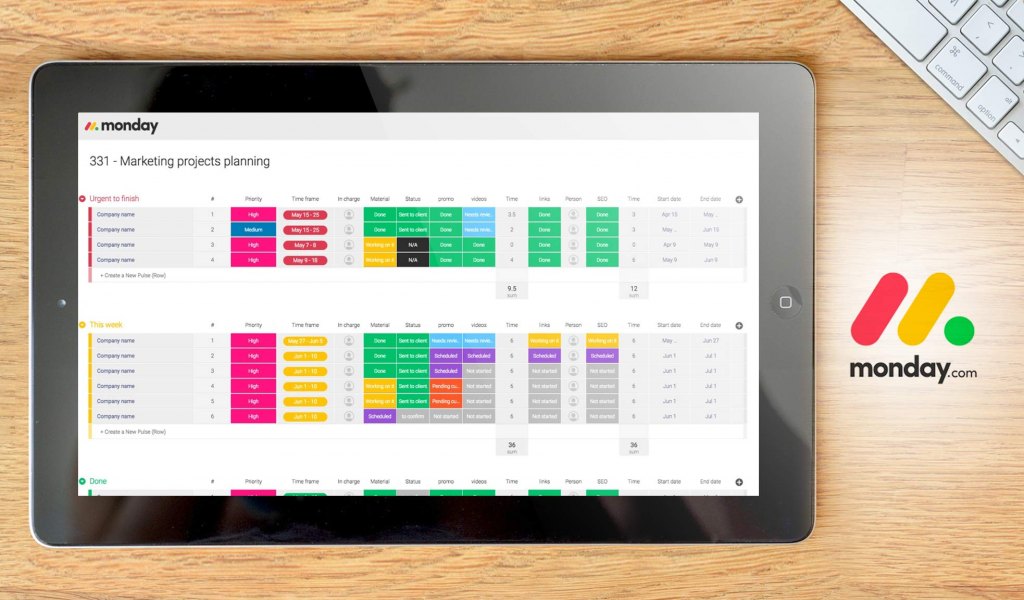
monday.com is flat out one of the best business software on the market today. It is a highly customizable platform and is widely used as an inventory software solution by SMEs. The product is not only highly customizable according to your needs, but it is also very intuitive to use. This is thanks to its highly-visual dashboard, which is fitted with customizable tools. With these, you can easily connect your inventory management to other important facets of your operations.
Key inventory management features visibility tools, drill-downs by tags, workflow management, collaboration tools, and team management. This is on top of robust monday.com features for project management. Also, it is made even more powerful by its many integrations and automation. In fact, it is being used as a hub for software stacks by many companies. Moreover, from these integrations, one can set up automated actions through event triggers. This is what really makes monday.com a powerhouse.
Integrations include those with Shopify, Pipedrive, Jira, and Hootsuite. Also, monday.com has native mobile applications. So, both iOS and Android users can still be kept in the loop as they are out of the office or down on the warehouse floors. Pricing starts at $24 per month for three users billed annually.
Detailed monday.com Review
Key Features of monday.com
- Customizable Dashboards
- Inventory Tracking
- Workflow Management
- Automation Tools
- Collaboration Tools
- Powerful Integrations
- Highly-Visual Interface
- Team Management
3. ShipBob
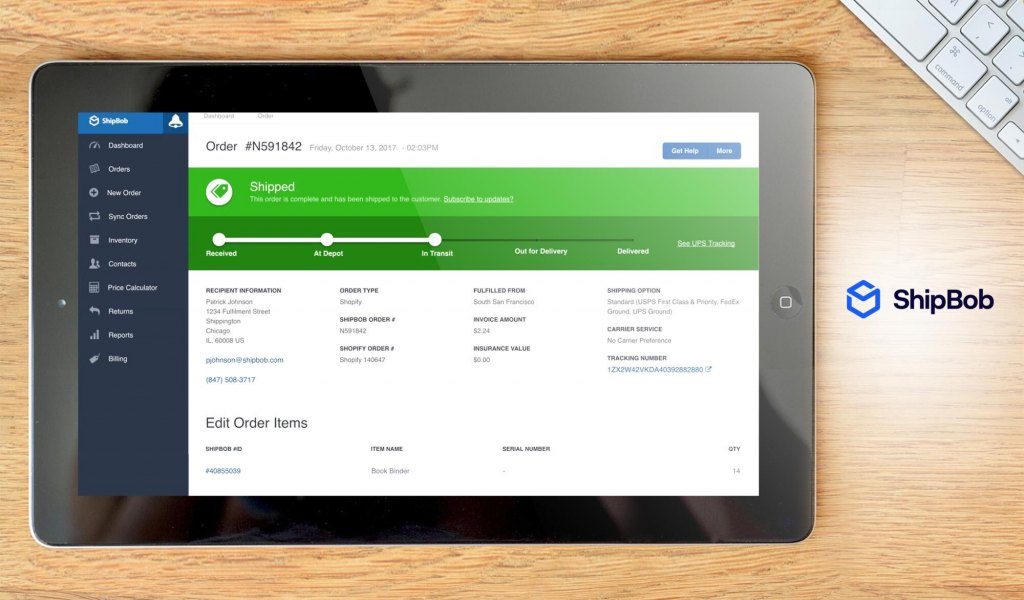
ShipBob is a cloud inventory management software solution best deployed by companies with ecommerce fulfillment operations. The platform provides users with tools to connect their inventory management processes with their ecommerce portal and also provide fulfillment solutions. In this way, companies can have hassle-free operations from stock delivery, storage, and fulfillment. ShipBob is popular among small and mid-size businesses. Moreover, it is also considered to be among the best 3PL companies around today.
Key features include warehouse kitting, distributed inventory support, and product warehousing. These are very crucial to ecommerce businesses. Also, these features allow users to manage their inventory across different fulfillment centers that ShipBob owns. With these tools, users can easily split up their inventory across geographies according to demands and forecasts.
Aside from a robust inventory management module, it also has features for return management, same-day shipping, delivery management, order management, international shipping, and ecommerce integrations. Moreover, ShipBob also offers discounted shipping. This is thanks to its tie-ups with other companies such as DHL, FedEx, and UPS. Thus, it is not your ordinary cloud inventory management solution, it is also a great fulfillment service as well.
Furthermore, the product is also fitted with analytics and reporting tools. These are housed in an easy-to-use dashboard and with easy-to-understand visualizations. Lastly, as it is deployed according to your needs, the product is available via a quote-based subscription plan.
Detailed ShipBob Review
Key Features of ShipBob
- Inventory Control
- Distributed Inventory
- Product Warehousing
- Warehouse Knitting
- Order Management
- Fulfillment Services
- Reporting and Analytics
- Delivery Management
4. GEP NEXXE
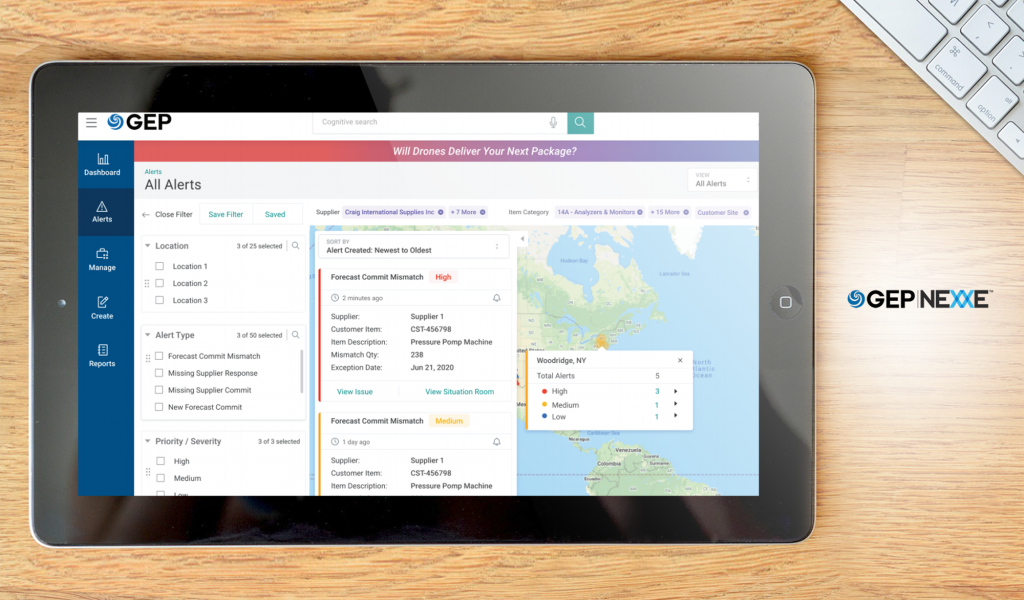
GEP NEXXE is a business software that rolls warehouse management, inventory management, and supply chain management into one solution. This end-to-end supply chain solution is used by companies of all sizes, from SMEs to large enterprises. Moreover, the software is valued by users for its collaborative analytics tools for inventory management.
These include solutions for forecasting, capacity planning, purchase orders, and quality management. These, together with other team management features makes GEP NEXXE a great go-to application for people-driven operations.
Also, its cloud inventory management software module is AI-powered and is combined with warehouse management tools. Key features include stock level management, demand forecasts, and critical levels. As these are also connected to a logistics management module, users can base their decisions on product demands and historical data.
Furthermore, GEP NEXXE has native applications for mobile devices on the App Store and Play Store. Thus, it can be used by mobile floor and field personnel. It also integrates seamlessly with other third-party solutions and, of course, other GPE applications. Lastly, it is available via a quote-based subscription plan.
Detailed GEP NEXXE Review
Key Features of GEP NEXXE
- Inventory Visibility
- Warehouse Management
- Stock Level Management
- Demand Forecasts
- Supply Chain Collaboration
- Capacity Planning Collaboration
- Quality Management
- Logistics Visibility
5. Cova
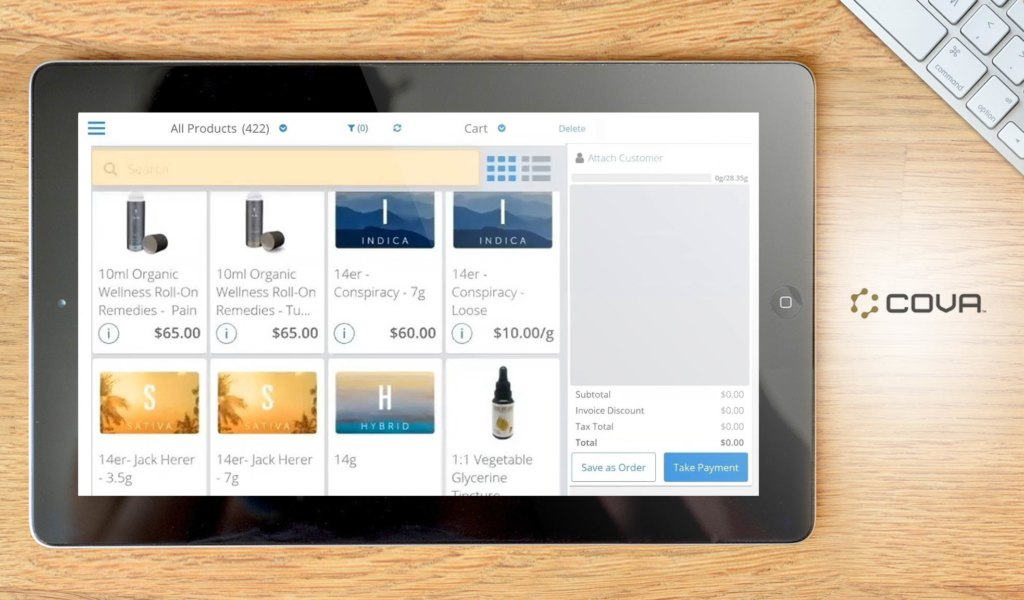
Cova is a joint inventory management tool and POS system for merchants in the cannabis industry in the US and Canada. Basically, Cova integrates cannabis inventory control with a point-of-sale interface system to automatically update inventory status in real-time. But, it is more than just that. Cova provides users with a centralized intelligence hub that rolls all business-specific processes into one platform.
Furthermore, it has features to handle customer queues, automated discounting, advanced inventory reporting, and quick transactions. Moreover, the software provides helpful legal and compliance features. These include statewide traceability, an age verification scanner, and one-click reporting for Canadian Compliance.
Furthermore, the product is also fitted with reporting tools and a highly-useful Insights on the go feature. Plus, Cova has an offline mode available so that users can make adjustments and other decisions without an internet connection. Of course, Cova gets updated once connected to the web again.
Cova integrates with third-party applications, including cannabis industry-specific ones like Weedmaps, Leafly, BudTender, and Baker.
Detailed Cova Review
Key Features of Cova
- Cannabis Industry Specific
- Centralized Intelligence Hub
- Advanced Inventory Reporting
- Cannabis POS Touch-Screen Menus
- Automatic Inventory Updates
- Age Verification Scanner
- Statewide Traceability Integration
- Offline Mode
6. Ruby Has Fulfillment
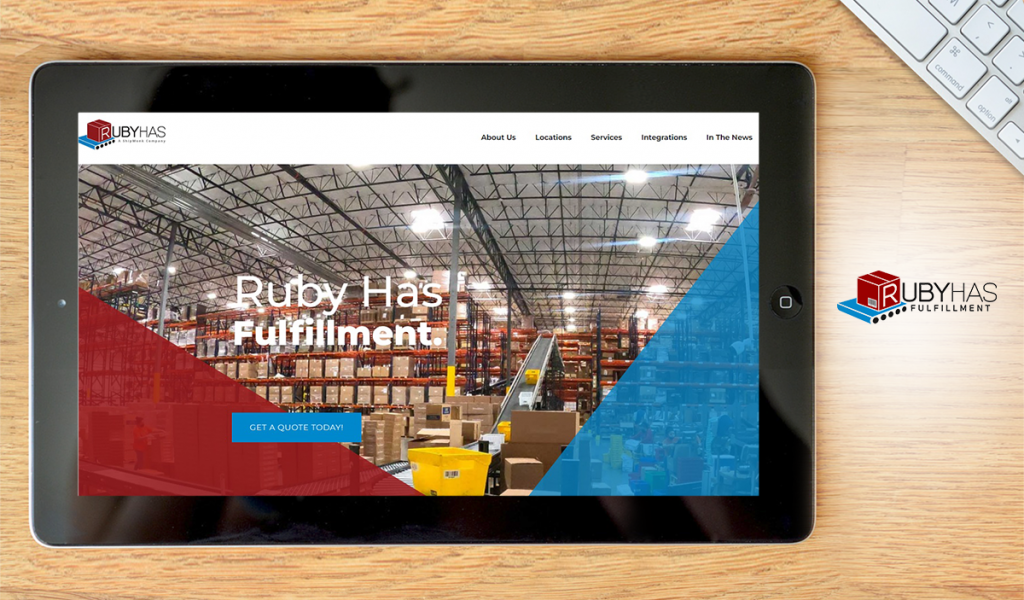
Ruby Has Fulfillment is one of the best same-day fulfillment solutions with a robust built-in inventory management system. It is specifically built for ecommerce businesses. The product helps streamline operations through various automation options for fulfillment center operations, inventory control, and quality management.
It also has a warehouse management module that you can integrate with your existing retail portals. This provides users with a 360-degree product and inventory visibility in real-time. Ruby Has Fulfillment also provides features to guarantee accurate order and inventory management. These include order validation, address validation and return management.
The platform is not just a software tool. It is also a service. Ruby Has Fulfillment connects its users to its partner network and makes discounted shipping rates available. The platform integrates with popular ecommerce platforms through its powerful API. These include Amazon, Walmart, Shopify, and eBay.
Detailed Ruby Has Fulfillment Review
Key Features of Ruby Has Fulfillment
- Inventory Control
- Real-Time Inventory Updates
- Fulfillment Center Automation
- Same-Day Fulfillment
- Quality Control
- Self-Service Portal
- Discounted Shipping Rates
- Pick and Pack Service
7. Zoho Inventory

Zoho Inventory is an easy-to-use customizable inventory platform ideal for ecommerce businesses. It provides users with end-to-end tracking tools that integrate the volume of orders and inventory levels. It does this via key integrations with popular cloud retailers and shipping services. The platform, of course, works best with Zoho applications for a total enterprise management solution.
Key features include inventory control, inventory optimization, order management, order fulfillment, customizable shipping labels, and purchase order management. Also, it has a software inventory tool to account for and manage digital assets.
Zoho Inventory also has automation tools for inventory replenishment, order processing, and billing. Like other Zoho products, it provides highly-visual reporting and analytics features. These include those for inventory levels and sales. Moreover, it has a delivery tracking capability as well that is also available on Android and iOS mobile devices.
Furthermore, the product integrates with third-party solutions and services. These include eBay, Amazon, Shopify, and DHL. It is also best paired with Zoho CRM for integrated customer support. Lastly, Zoho Inventory has a free edition and paid plans start at a very affordable $79 per organization per month.
Detailed Zoho Inventory Review
Key Features of Zoho Inventory
- Inventory Control
- Inventory Optimization
- Order Management
- Sales Analytics
- Ecommerce Integrations
- Fulfillment Integrations
- Software Inventory
- End-to-End Tracking
8. Vend
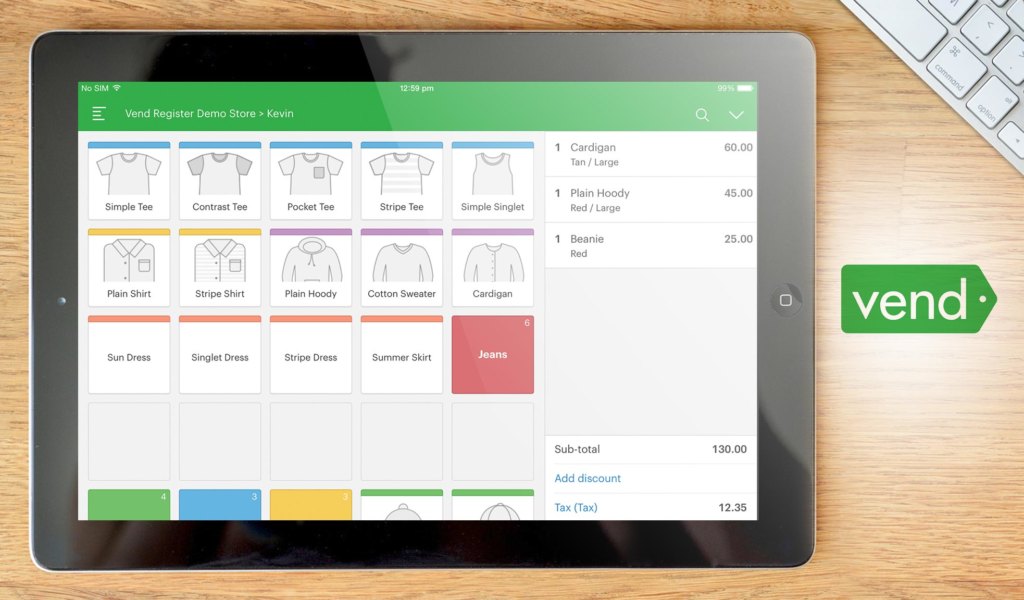
Vend is a cloud-based POS software whose core functionality revolves around inventory management for retail businesses. The product is easy to use and is highly scalable. Thus, you can find it being used by companies of different sizes. It is also popular among individuals engaged in their personal ecommerce business.
Its inventory management module is connected to its POS—both its web-based and iPad application portals. So, users can rest assured that they will get real-time automatic updates. The module also has a dashboard containing important performance indicators like stock levels. Moreover, it has a feature to create variants and composites.
Additionally, Vend is optimized for mobile for handy barcode creation and scanning. In this way, users will also have a drill-down view of their inventory, from one individual product to another.
Furthermore, the product integrates with other third-party accounting tools like QuickBooks and Xero for more in-depth analysis or syncing. Of course, it also works well with ecommerce solutions such as Shopify. Lastly, its premium plans start at $119 per month.
Detailed Vend Review
Key Features of Vend
- Inventory Control
- Barcodes and Labels
- Product Variants
- Composites
- Online Store
- iPad POS
- Ecommerce
- Cash Management
9. QuickBooks Enterprise
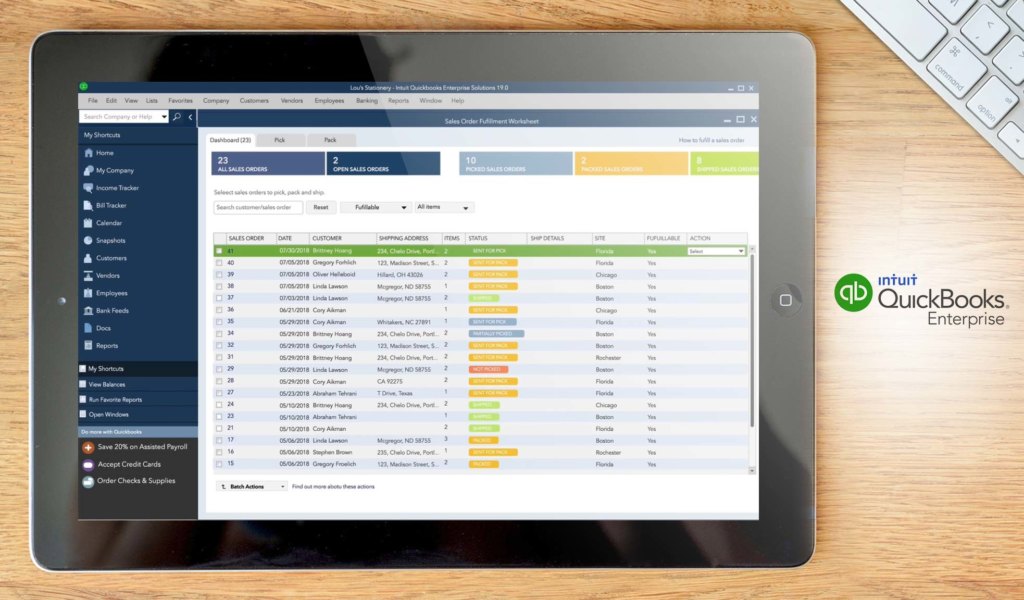
QuickBooks Enterprise is comprehensive inventory management software with industry-specific features. Thus, it is widely used by many different types of businesses of different scales—from retail to manufacturing. It is known for its advanced inventory management features. Also, QuickBooks Enterprise has an on-premise version.
Features include inventory tracking, inventory transfer, and custom inventory reports. Like other top applications, QuickBooks Enterprise also supports multiple inventory location support. Moreover, it also has modules for shipping management and sales order management. By integrating inventory and sales, users will be able to enhance their pick, pack, and ship operations.
The platform, of course, works best with other QuickBooks applications. But it has integrations with more than 200 third-party software services, including those for CRM, POS, and project management. Furthermore, it makes its API available so that it can connect with virtually any software tool. Pricing starts at $198 per month.
Detailed QuickBooks Enterprise Review
Key Features of QuickBooks Enterprise
- Inventory Tracking
- Multiple Inventory Location
- Inventory Transfer
- Cycle Count
- Custom Inventory Reports
- Mobile Barcode Scanning
- Shipping Manager
- Sales Order Management
10. Cin7
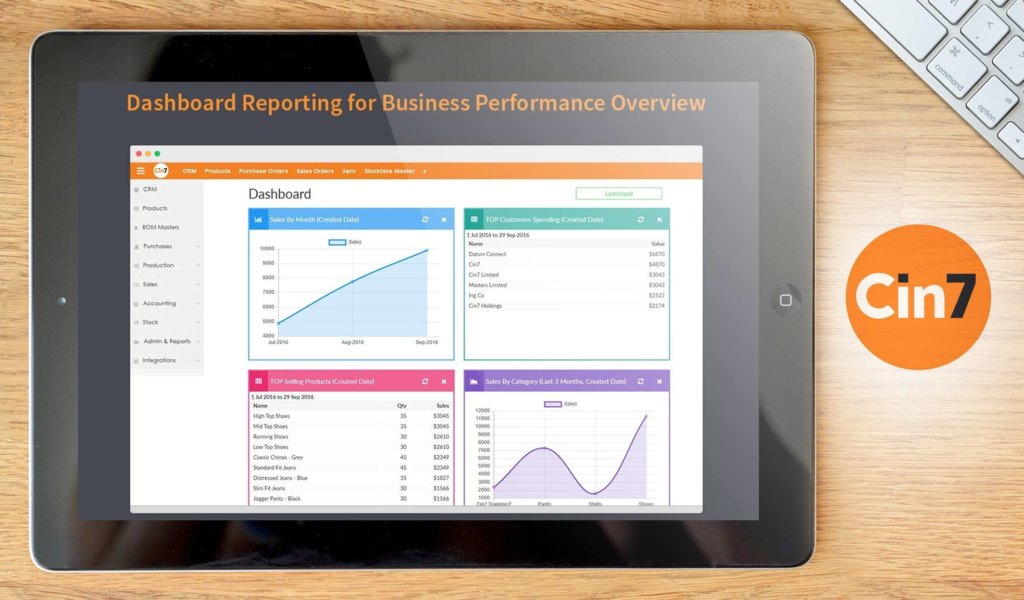
Cin7 is an automated inventory management system with a POS module. The platform is completely cloud-based and is flexible enough to be used by businesses of any size and in many different industries. The product basically connects your inventory with multiple sales channels so you can keep track of complex multi-location operations using a single command center.
Key features include warehouse management, forecasting, batch traceability, mobile stock tracking, and analytics with custom dashboard capability. Moreover, the backend of its POS module is also very intuitive and is capable of multiple-inventory syncing every after a sale. Also, the front-end for customers is clean and easy to use as well.
Cin7 integrates well with other platforms. In fact, it has more than 350 integrations, including those with ecommerce solutions and online marketplaces. Also, it works well with 3PL solutions. Lastly, pricing starts at $299 per month.
Detailed Cin7 Review
Key Features of Cin7
- Multiple Inventory Sync
- Third-Party Logistics
- Warehouse Management
- Mobile Stock Tracking
- Batch Traceability
- POS Module
- Data Mining
- KPI Tracking
11. Hippo CMMS

Hipppo CMMS is a highly-specialized inventory and maintenance management solution. It unifies facility and asset management with preventive maintenance management. Inventory management features include barcode scanning, fleet database, vendor management, facility management, site maps, parts management, inventory transfers, and equipment management. Also, the platform is very easy to use. All of its features are housed in a very intuitive user interface.
Moreover, its maintenance management module includes key features such as maintenance reports, work order management, cost tracking, maintenance request portal, and fleet maintenance management. The software provider also has native Hippo Mobile CMMS applications for both iOS and Android devices. In this way, all team members will be kept in the loop and can update task statuses whether they are on the field or on the warehouse floor.
Furthermore, Hippo CMMS integrates with other applications to extend its capabilities. These include Active Directory, Azure, LDAP, and Okta SSO. Lastly, pricing starts at $55 per month per user.
Key Features of Hippo CMMS
- Inventory and Parts Management
- Fleet Management
- Facility Management
- Site Maps
- Vendor Management
- Barcode Scanning
- Interactive Floor Plans
- Maintenance Request Portal
12. Shopventory
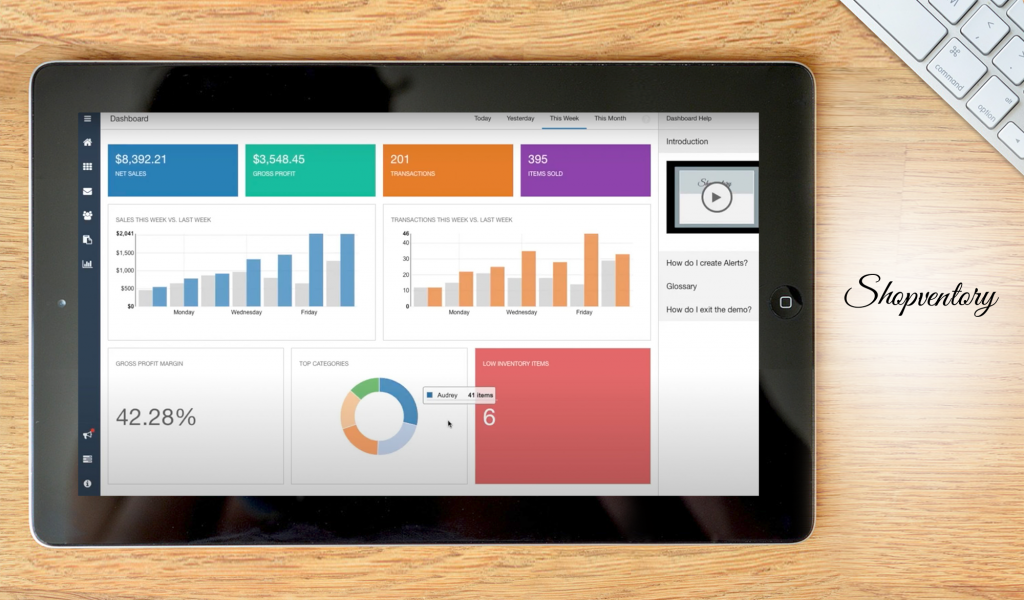
Shopventory is a seamless combination of inventory and sales management software solutions. The product is popular among SMEs across different industries. However, it is ideal for retail and ecommerce. Key features include inventory control, vendor management, sales forecasting, product bundles, and purchase order management.
It is also known for its mobile app that turns any device into a handy barcode reader. With its real-time syncing ability, users cannot only track inventory levels in real-time but also create product codes or SKUs as they go. Of course, a dashboard app is also available for both iOS and Android devices. A free trial si available, so you can test out these features yourself.
Furthermore, these features allow for real-time inventory updates as Shopventory automatically subtracts sold items from your inventory across different storage locations. Shopventory is also fitted with analytics and reporting features for both inventory and sales. These can also be used to set up notifications when a certain parameter is reached or an event is triggered. So, this is useful for stock level alerts and sales status.
Shopventory integrates with POS and ecommerce applications. These include Stripe, BigCommerce, Stripe, and Shopify. It also has a QuickBooks Online integration for accounting. Lastly, this cloud inventory management software solution is offered via four premium plans starting at $79 per month billed annually.
Detailed Shopventory Review
Key Features of Shopventory
- Barcode Scanning App
- Inventory Control
- Invoicing
- Sales Real-Time Auto-Sync
- Vendor Management
- Purchase Order Management
- Product Bundles Creation
- Multi-Location Storage Support
13. ManagerPlus

ManagerPlus is an inventory management platform best suited to businesses in the manufacturing and construction industries that involve fleet operations and facility maintenance. The product comes in five modules: inventory management, asset management, preventive maintenance, work order management, and an inspection module.
Its key features include inventory tracking, inventory forecasting, barcode scanning and printing, work order management, and preventive maintenance scheduling. It also has a robust analytics module, complete with an extensive filtering feature and intuitive visualizations.
Moreover, ManagerPlus is also available via mobile apps for Android and iOS devices. So, field and warehouse personnel can always be kept in the loop and make real-time reports on progress. This highly-specialized inventory management platform is available via monthly subscription plans. Paid plans start at $85 per user every month.
Detailed ManagerPlus Review
Key Features of ManagerPlus
- Inventory Tracking
- Asset Management
- Inventory Forecasts
- Work Order Management
- Planning Calendar
- Audit Trail
- Preventive Maintenance Scheduling
- Barcode Scanning and Printing
14. ShipHero
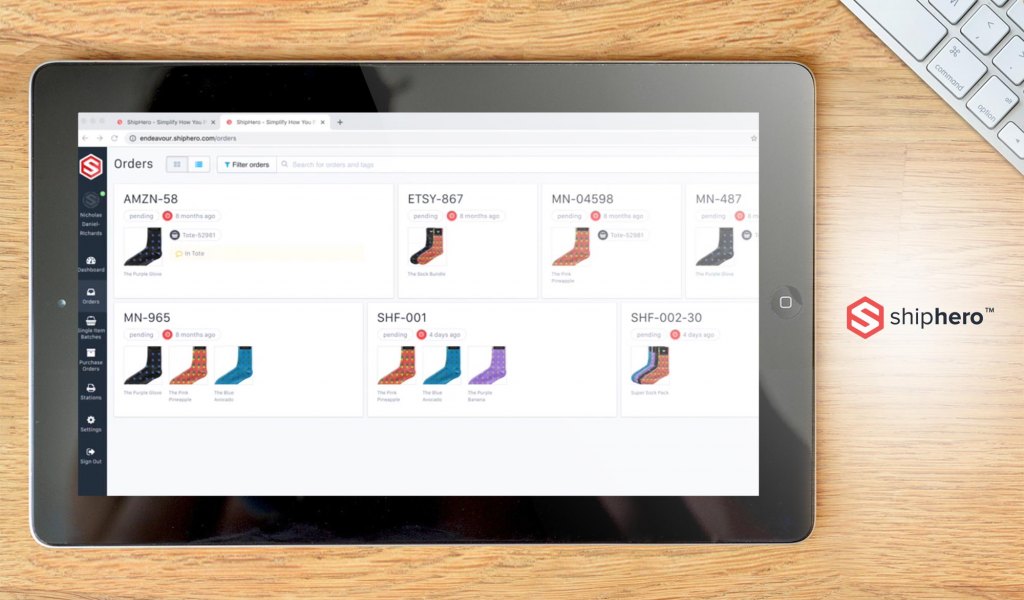
ShipHero is also an end-to-end inventory and warehouse management solution. Key features include inventory management, shipping management, order management, returns management, and vendor management. The product is ideal for ecommerce businesses that need 3PL services. And, ShipHero is one of the best 3PL companies today.
The platform provides great inventory visibility. This allows team members to easily find products on the warehouse floor, manage stock levels, and track inventory status. Also, it is equipped with a barcode scanning module and product identification ability. Like other top applications, it provides automation tools to help users streamline their operations by taking clerical tasks off of their plates.
Other features include 3PL billing, dynamic slotting, and warehouse routing. It also has customer-centric tools, including contract options and customer portals. In this way, customers can have a hassle-free purchase experience. Moreover, ShipHero offers analytics and reporting tools for forecasting and historical data analysis.
Furthermore, the web-based solution has mobile apps for iOS and Android devices. It also integrates with over 20 applications for ecommerce and shipping. These include Amazon, eBay, BigCommerce, Walmart, and FedEx. Lastly, pricing starts at $499 per month.
Detailed ShipHero Review
Key Features of ShipHero
- Inventory Management
- Warehouse Management
- Dynamic Slotting
- Barcode Scanning
- Product Identification
- Contract Options
- Customer Portals
- Warehouse Routing
15. Katana

Katana is an end-to-end web-based platform for manufacturing businesses. It is known for its robust inventory management system that is well integrated with production operations. Katana is ideal for small and medium manufacturing businesses. Key inventory management features include real-time inventory control, material availability, stock level optimization, product variants management, and automation tools.
These are seamlessly connected with production operations features like routing, production recipes, production planning, manufacturing grid, and purchase order management. Moreover, it also has features for sales, including a sales grid and a sales management module. This makes it a true end-to-end solution.
The product also works well with third-party applications, including ecommerce services. These include Shopify, WooCommerce, eBay, and Big Commerce. Moreover, it also integrates with accounting tools such as QuickBooks and Xero.
This web-based solution is offered in a hassle-free one standard plan deployment at $99 per month. However, additional fees will be charged when you add users and inventory locations. Because of such flexibility, the platform can scale with a business’ growth.
Detailed Katana Review
Key Features of Katana
- Manufacturing Grid
- Automatic Inventory Management
- Real-Time Inventory Control
- Material Availability
- Stock Level Optimization
- Production Recipes
- Routing
- Production Planning
What cloud inventory management software suits you?
That will depend on the type of business you have and the direction you want to go. However, when it comes to the comprehensiveness of features, ease-of-use, and integrations, NetSuite ERP’s inventory solution is hands-down one of the best. The platform provides users with an end-to-end solution that does not only starts and stop with warehouse management. It provides tools for managing your inventory lot, stock items with serial traceability, and even has an in-transit inventory tracking capability.
Also, another neat thing about NetSuite ERP is that it is deployed according to your needs. Thus, you will not have excess features that you don’t really need. Of course, you can always add modules and capabilities as your company grows. So, this level of flexibility is something that is important in a very dynamic market today. Also, with NetSuite ERP’s integrations, you can also extend its capabilities and make its deployment not only industry-specific but you-specific.
However, it is best to consider best practices in implementation. This is because it doesn’t matter if you have the best tools if you don’t really know how to use them. The best way, in our opinion, to go about this is to create a diverse digital transformation team with each member representing a relevant department or function. Then, you task them to do more research about the product, its use cases, and to participate in the free demo that NetSuite ERP makes available to prospective clients. In this way, you will, at the least, have different perspectives coming from different business functions.
Lastly, make sure that your product research and analysis are informed by the latest supply chain management trends. This will enable you to be up to date on the state of the industry, best practices, and its future directions.
Key Insights
- NetSuite ERP: The top cloud inventory management software for its comprehensive features, including complete inventory visibility, multi-location tracking, and automation options.
- monday.com: Highly customizable and intuitive, suitable for SMEs, with features for inventory tracking, workflow management, and powerful integrations.
- ShipBob: Ideal for ecommerce businesses, offering inventory management integrated with fulfillment solutions, and supporting distributed inventory.
- GEP NEXXE: Combines warehouse, inventory, and supply chain management with AI-powered tools, suitable for businesses of all sizes.
- Katana: End-to-end platform for manufacturing businesses, integrating inventory management with production operations.
- Cova: Specialized for the cannabis industry, combining inventory management with POS, and including compliance features.
- Ruby Has Fulfillment: Focuses on ecommerce with same-day fulfillment, real-time inventory updates, and discounted shipping rates.
- Zoho Inventory: User-friendly and customizable, ideal for ecommerce, with automation tools and seamless integrations with other Zoho products and third-party services.
- Vend: POS software with robust inventory management, real-time updates, and mobile optimization.
- QuickBooks Enterprise: Advanced inventory management with multiple location support, custom reports, and extensive integrations.
- Cin7: Automated inventory management with POS module, suitable for multi-location operations and extensive third-party integrations.
- Hippo CMMS: Specialized in inventory and maintenance management for facilities and assets, including preventive maintenance.
- Shopventory: Combines inventory and sales management, ideal for SMEs, with real-time auto-sync and barcode scanning.
- ManagerPlus: Suitable for manufacturing and construction industries, offering inventory tracking, asset management, and preventive maintenance.
- ShipHero: End-to-end solution for inventory and warehouse management, ideal for ecommerce businesses with 3PL services.
FAQ
- What is the best cloud inventory management software? The best cloud inventory management software is NetSuite ERP. It offers complete inventory visibility, multi-location support, and various automation options, making it suitable for businesses of all sizes and industries.
- How does cloud inventory management software benefit businesses? Cloud inventory management software reduces hardware expenses, provides real-time operational visibility across multiple locations, and allows for remote management. This is particularly beneficial for companies with multiple operations and warehouses globally.
- What features should I look for in cloud inventory management software? Key features to look for include inventory tracking, multi-location support, automation tools, integration capabilities, real-time updates, and user-friendly interfaces. Industry-specific features might also be important depending on your business needs.
- Can small businesses benefit from cloud inventory management software? Yes, small businesses can greatly benefit from cloud inventory management software by improving efficiency, reducing errors, and gaining better control over their inventory. Many solutions, like monday.com and Zoho Inventory, are tailored for SMEs.
- Are there industry-specific cloud inventory management solutions? Yes, there are industry-specific solutions such as Cova for the cannabis industry and Katana for manufacturing businesses. These solutions offer specialized features tailored to the unique needs of their respective industries.
- What integrations are important for cloud inventory management software? Important integrations include those with ecommerce platforms (e.g., Shopify, WooCommerce), accounting tools (e.g., QuickBooks, Xero), and CRM systems (e.g., Salesforce). These integrations help streamline operations and provide a comprehensive view of business processes.
- How do I choose the right cloud inventory management software for my business? To choose the right software, consider your business size, industry-specific needs, required features, ease of use, and integration capabilities. It is also beneficial to involve a diverse team in the decision-making process and utilize free trials or demos offered by software providers.


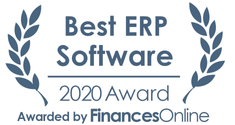


























Leave a comment!